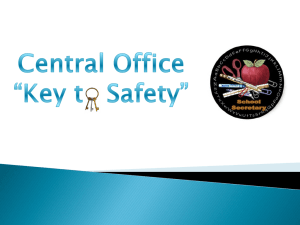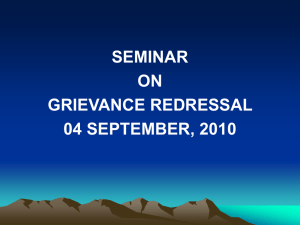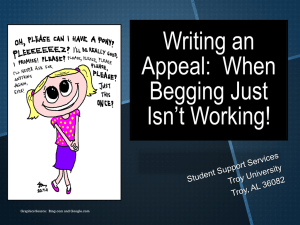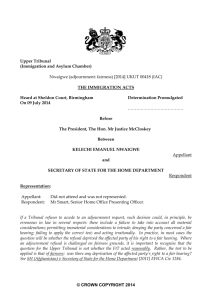Guidelines for Conducting Discipline and Appeal Hearings
advertisement
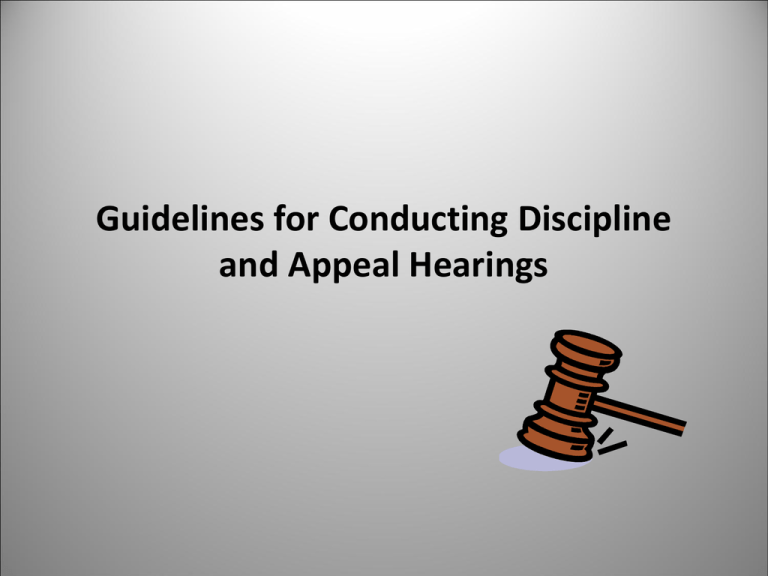
Guidelines for Conducting Discipline and Appeal Hearings PART 1 – Introduction • Intended to provide guidance to those who are or may be involved in Discipline and Appeal hearings at the CLA, MA/AMA, and local levels. Part 2 – Natural Justice • What is “Natural Justice”? – Put simply, it is the duty to be fair and it binds us at all levels of the governance of lacrosse in Canada. • The specific requirements are flexible, depending on the issues in question and the seriousness of the consequences. The typical requirements are: (a) Adequate notice of the facts and offence alleged; (b) Adequate notice of the hearing; (c) Adequate preparation time; (d) A disinterested (unbiased) deciding body; Part 2 – Natural Justice (e) A fair hearing allowing presentations from both sides and an opportunity to rebut allegations; (f) The opportunity to be represented by an agent or lawyer; (g) A decision based on the evidence and arguments heard; (h) A decision in a reasonable time; (i) Reasons for the decision, preferably in writing; (j) An opportunity for independent review (appeal) of the decision. • It is not necessary to conform to the requirements of a formal court trial or appeal. PART 3 – Application of the Rules of Natural Justice to the Discipline/Appeal Process Here is how the Rules apply: (a) Adequate notice of the facts and offence alleged: – All parties must receive all the information that the tribunal has. – The person in jeopardy must know exactly what wrong is alleged against him, citing any applicable Bylaw, Rule, or Regulation. PART 3 – Application of the Rules of Natural Justice to the Discipline/Appeal Process (b) Adequate notice of the hearing – All interested parties must receive notice of the date, time, and place of the hearing. – Within reason, the hearing must be scheduled so that all interested parties are able to attend. – The parties should be directed to the policies which govern the process. (c) Adequate preparation time – This speaks for itself. PART 3 – Application of the Rules of Natural Justice to the Discipline/Appeal Process (d) A disinterested (unbiased) deciding body – In sporting organizations, especially those like ours, it may be impossible to find members for a tribunal who do not know the parties. Fortunately, that is not necessary. – The members of the tribunal must not have any biases in favour of, or against, any of the parties, or any interest in the outcome. Nor can there be any appearance that there is (in the eyes of a reasonable person who is not involved in the matter). PART 3 – Application of the Rules of Natural Justice to the Discipline/Appeal Process (e) A fair hearing allowing presentations from both sides and an opportunity to rebut allegations – Each party must be allowed to fully state and present their evidence and argument. – Each party must be allowed to question witnesses. – The tribunal may question witnesses or require information to be provided. – Use the following order in the presentation of evidence and arguments for an efficient and orderly process: • (i) complainant/appellant; • (ii) accused/respondent; • (iii) reply of complainant/appellant. PART 3 – Application of the Rules of Natural Justice to the Discipline/Appeal Process (f) Representation by an agent or lawyer – Some people are not confident or adequately skilled in presenting their case, so let them be represented by a lawyer or agent (e.g. club president, parent, coach) if they wish. (g) A decision based on the evidence and arguments heard – The tribunal cannot make a decision based on something the parties did not know about or had an opportunity to call evidence about or argue about. PART 3 – Application of the Rules of Natural Justice to the Discipline/Appeal Process (h) A decision in a reasonable time – This means that the time from when the complaint was made to when the decision was made must be reasonable. – It depends on the circumstances. – Sometimes the delay of two months will cause no prejudice, so that would not be unreasonable. In other cases, the delay of one week could be highly prejudicial (e.g. suspension during the playoffs). – It only has to be done in a time that is reasonable, which includes consideration of the ability of the organization to organize the hearing. PART 3 – Application of the Rules of Natural Justice to the Discipline/Appeal Process • (i) Reasons for the decision, preferably in writing – This is very important because the parties need to know why the decision was reached. Examples are found on the CLA website. – If witnesses contradict each other, on significant issues, and the tribunal prefers one over the other, the tribunal must say why. – All arguments and issues presented by the parties must be dealt with in the decision. – It is acceptable and desirable to render the result of the decision and issue reasons later, within a reasonable time. A template to assist in drafting a decision on a discipline or appeal heaering follows later in this presentation • (j) An opportunity for independent review (appeal) of the decision – More will be said about this in the next part. PART 4 – Appeals • Normally, an appeal is not a hearing de novo, meaning the whole hearing is repeated – This is very inefficient and, so long as the tribunal did not break any rules, unnecessary. – If the hearing was unfair, however, it will be necessary to do it over. • An appeal hearing may receive evidence that was not previously heard, but it should not if the evidence would have been made available below by the exercise of reasonable diligence or if the evidence could not make a difference. PART 4 – Appeals • In order to conduct an appeal without doing the hearing over, it is necessary that there be an adequate record from the original hearing. – If there is any dispute over what the viva voce (living voice) evidence was which cannot be resolved, the evidence will have to be heard again. – The best way to handle this is to audio record the hearing. • Because there may be further appeals or even review by a Court, the appeal hearing should also be audio recorded. PART 4 – Appeals • When an appeal is heard, so long as the original hearing was fair and there is an adequate record, the standard of review should be reasonableness. – In other words, if the appeal tribunal would have reached a different result, but it has not been shown that the decision appealed from was one that no reasonable tribunal could reach, the appeal should be dismissed. – This preserves the true function of an appeal which is not just a “do‐over” opportunity. – It reduces the number of appeals, is efficient, and gives the authority to the original tribunal that it should have. PART 5 – Bylaws/Regulations/Policies • It is highly advisable to have written procedures for every organization which govern discipline and appeals. – These must be scrupulously followed. Written Decision Template • Date • Subject • Composition of Panel – Identify each member and their CLA position and the Chair • In Attendance – Identify all attending and why • Hearing Process – Describe the process that was followed in the hearing (i.e. was it recorded, who gave evidence, who argued, etc.) Written Decision Template • Background and Issues – Summarize the facts relating to the matter and what the issues were which were raised by the parties and the panel • Decision – State, concisely, the decision • Summary of the Evidence and Arguments – Summarize the relevant evidence and the source of it and the arguments from each party Written Decision Template • Reasons for Decision – Set out your findings of fact and your decisions on each issue and argument and explain how you came to each conclusion • Recommendations and Observations (optional) – Provide your insight as to needed policy changes or other measures to be undertaken by the CLA or others




